Business workflow automation software streamlines routine tasks, reducing manual effort and minimizing errors. By integrating business process automation tools, companies can transform their operations, making processes faster and more cost-effective. This adoption not only enhances productivity but also allows businesses to allocate their resources more strategically. With real-world applications ranging from automated invoicing to customer service management, the impact of such technology is profound. This blog explores the top business workflow automation software, offering insights into how they can revolutionize your business processes. Whether you're a small business looking to automate for the first time or a large enterprise seeking to refine your operations, understanding the landscape of business process automation software is the first step towards achieving streamlined efficiency.
How to Choose the Best Workflow Automation Software for Your Business?
Selecting the right workflow automation software for your business is a crucial decision that can significantly impact your operational efficiency and productivity. Here are key factors to consider when evaluating and choosing the best workflow automation software solution:
- Ease of Use: Opt for software that is user-friendly and intuitive, ensuring that your team can quickly adapt to the new system without extensive training.
- Scalability: Choose a software solution that can grow with your business, accommodating increasing workflow complexities and volumes as your organization expands.
- Customization Options: Look for software that offers customization capabilities, allowing you to tailor workflows to match your specific business processes and requirements.
- Integration Capabilities: Ensure that the software can seamlessly integrate with your existing systems and tools, facilitating smooth data exchange and workflow coordination.
- Security Features: Prioritize software solutions that offer robust security measures such as data encryption, user access controls, and compliance with industry standards to protect sensitive business information.
- Pricing Structure: Consider the pricing model of the software, including upfront costs, subscription fees, and any additional charges for advanced features or support services.
- Customer Support: Evaluate the level of customer support provided by the software vendor, including availability, responsiveness, and expertise to address any technical issues or queries promptly.
- User Reviews: Take into account feedback from other users regarding their experiences with the software, focusing on aspects like reliability, performance, ease of implementation, and customer satisfaction.
By carefully assessing these factors and aligning them with your specific business needs and objectives, you can make an informed decision when selecting the best workflow automation software for your organization. Remember to prioritize solutions that not only automate tasks but also enhance collaboration, streamline processes, and drive better business outcomes in the long run.
Top 10 Business Workflow Automation Software
When it comes to selecting the best business workflow automation software, it's essential to consider various factors like integrations, customization, ease of use, and scalability. Here are the top 5 business workflow automation software based on their features and capabilities:
1. Zapier
Zapier is a popular business workflow automation tool that allows users to connect and automate tasks between different web applications without the need for coding. It simplifies workflows by creating automated actions triggered by specific events, known as "Zaps."
Key Features:
- Extensive Integrations: Zapier offers over 2,000 app integrations, allowing users to connect various tools and automate workflows seamlessly.
- No-Code Automation: With a user-friendly interface, Zapier enables users to create automation workflows without any coding knowledge.
- Multi-Step Zaps: Users can create multi-step Zaps to automate complex workflows involving multiple actions across different apps.
- Customizable Triggers and Actions: Zapier provides customizable triggers and actions to tailor automation workflows to specific business needs.
- Task Automation: Users can automate repetitive tasks like data entry, file management, email notifications, and more to improve productivity.
Pros:
- Ease of Use: Zapier's intuitive drag-and-drop interface makes it easy for users to create automation workflows without technical expertise.
- Extensive Integrations: With a vast library of app integrations, Zapier offers flexibility in connecting various tools and automating tasks.
- Time-Saving: Automating repetitive tasks saves time and reduces manual errors, allowing users to focus on more strategic activities.
- Scalability: Zapier's multi-step Zaps and customizable actions cater to businesses of all sizes, from startups to enterprises.
- Cost-Effective: Zapier's pricing plans are affordable, making it accessible to businesses looking to streamline their workflows on a budget.
Cons:
- Complexity for Advanced Workflows: While Zapier is user-friendly, creating complex automation workflows may require a deeper understanding of its features and capabilities.
- Limited Control: Users may encounter limitations in customization options for specific actions or triggers compared to more advanced automation tools.
Zapier vs. Nected
| Feature | Zapier | Nected |
| No-code workflow creation | ✅ | ✅ |
| Integration capability | ✅ | ✅ |
| Multi-step workflows | ✅ | ✅ |
| Pre-built templates | ✅ | ✅ |
| Task history and monitoring | ✅ | ✅ |
| Cost-effectiveness | ❌ | ✅ |
| Custom code integration | ❌ | ✅ |
| Dedicated support | ❌ | ✅ |
| User-friendly interface for beginners | ✅ | ✅ |
| Tailored solutions for SMEs | ❌ | ✅ |
In conclusion, Zapier is a versatile business workflow automation tool that simplifies task automation, enhances productivity, and streamlines processes through its extensive integrations and user-friendly interface.
2. ClickUp
ClickUp is an all-in-one productivity platform designed to streamline tasks, projects, goals, and workflows in a single unified workspace. With a mission to enhance productivity, ClickUp offers a wide range of features and capabilities to cater to various work environments and team needs.
Key Features:
- Flexible Workflows: ClickUp provides exceptional flexibility with 15 different views, including list, board, Gantt, and more, allowing users to customize their workspace according to their preferences.
- AI-Powered Productivity: Leveraging AI technology, ClickUp offers an AI-powered assistant tailored to different roles, helping users work faster and more efficiently.
- Seamless Integrations: ClickUp easily integrates with other tools, eliminating app sprawl and reducing software spend by replacing multiple standalone applications.
- Customization: Users can configure ClickUp to suit different types of work with ease, from time tracking and sprints to custom fields and task templates.
- Automation: ClickUp's automation feature enables users to create custom automations without any coding, allowing for the automation of repetitive tasks and processes.
Pros:
- Comprehensive Solution: ClickUp serves as an all-in-one platform for tasks, docs, goals, chat, and more, eliminating the need for multiple tools and enhancing collaboration.
- Productivity Boost: By centralizing work in one place, ClickUp helps users save time, streamline processes, and improve overall productivity.
- Customizable Workflows: With flexible agile workflows, visual roadmaps, and AI-powered writing support, ClickUp caters to the diverse needs of different teams and projects.
- User-Friendly Interface: ClickUp's intuitive interface and customizable features make it easy for teams to adapt the platform to their specific requirements.
- Cost-Effective: ClickUp offers a free forever plan with additional paid options, making it accessible to teams of all sizes and budgets.
Cons:
- Mobile App Limitations: Some features available on the desktop version may not be fully accessible on the mobile app, potentially limiting functionality for users on the go.
Nected vs. ClickUp
| Feature | Nected | ClickUp |
| Integration capability | ✅ | ✅ |
| Multi-step workflows | ✅ | ❌ |
| Pre-built templates | ✅ | ✅ |
| Task automation beyond project management | ✅ | ❌ |
| Cost-effectiveness | ✅ | ❌ |
| Custom code integration | ✅ | ❌ |
| Ease of Using | ✅ | ❌ |
| Dedicated support | ✅ | ❌ |
| Comprehensive API access | ✅ | ✅ (Limited) |
| Tailored solutions for SMEs | ✅ | ❌ |
In summary, ClickUp stands out as a versatile and powerful task automation software that simplifies workflows, enhances collaboration, and boosts productivity across teams of all sizes.
3. Integrify
Integrify is a robust business process management and workflow automation software designed to streamline and optimize processes within organizations. With a focus on process collaboration and automation, Integrify offers a range of features to enhance efficiency and productivity in various business operations.
Key Features:
- Drag-and-Drop Builder: Integrify's intuitive drag-and-drop interface allows users to design and customize workflows easily without the need for coding.
- Process Collaboration: The platform facilitates collaboration among team members by providing visibility into workflow progress, task assignments, and approvals.
- Automation Rules: Integrify enables users to create automation rules to trigger actions based on specific events or conditions, reducing manual intervention.
- Reporting and Analytics: Users can generate reports and analyze workflow data to gain insights into process performance, bottlenecks, and areas for improvement.
- Custom Forms: Integrify offers customizable forms to capture data efficiently and accurately within workflows, ensuring seamless information flow.
Pros:
- Process Efficiency: Integrify helps organizations streamline processes, reduce manual errors, and improve operational efficiency through automation and collaboration features.
- User-Friendly Interface: With its intuitive drag-and-drop builder and customizable forms, Integrify makes it easy for users to design and manage workflows without extensive technical expertise.
- Visibility and Transparency: The platform provides visibility into workflow progress, task assignments, approvals, and analytics, enabling better decision-making and process optimization.
- Scalability: Integrify is scalable to meet the evolving needs of businesses of all sizes, from small teams to large enterprises.
- Compliance and Audit Trails: Integrify offers features for maintaining compliance with regulations by providing audit trails and ensuring data security within workflows.
Cons:
- Pricing Transparency: Pricing information for Integrify is available upon request, which may pose challenges for businesses looking for upfront pricing details.
Nected vs. Integrify
| Feature | Nected | Integrify |
| No-code workflow creation | ✅ | ✅ |
| Advanced integration options | ✅ | ✅ |
| User-friendly interface for beginners | ✅ | ❌ |
| Custom code integration | ✅ | ✅ ( Limited ) |
| Cost-effectiveness | ✅ | ❌ |
| Comprehensive reporting and analytics | ✅ | ❌ |
| Rapid deployment capabilities | ✅ | ❌ |
| Mobile app availability | ✅ | ❌ |
| Scalability for enterprise use | ✅ | ✅ |
| Dedicated support | ✅ | ❌ |
In conclusion, Integrify is a comprehensive business process management software that empowers organizations to automate workflows, enhance collaboration, and drive operational efficiency.
4. Kissflow
Kissflow is a cloud-based business process management and workflow automation software that empowers organizations to streamline their processes, improve efficiency, and drive productivity. With a focus on simplicity and flexibility, Kissflow offers a range of features to automate workflows, manage tasks, and enhance collaboration within teams.
Key Features:
- Workflow Automation: Kissflow enables users to automate repetitive tasks, approvals, and processes to save time and reduce manual errors.
- Form Builder: The platform provides a user-friendly form builder tool to create custom forms for data collection within workflows.
- Reporting and Analytics: Users can generate reports, track performance metrics, and gain insights into process efficiency through Kissflow's reporting and analytics features.
- Task Management: Kissflow offers task management capabilities to assign tasks, set deadlines, and track progress within workflows.
- Integration Capabilities: The software integrates with various third-party applications to streamline data exchange and enhance workflow connectivity.
Pros:
- Ease of Use: Kissflow's intuitive interface and drag-and-drop form builder make it easy for users to design workflows and create custom forms without technical expertise.
- Reporting Tools: The platform's reporting and analytics features provide valuable insights into process performance, bottlenecks, and areas for improvement.
- Task Automation: By automating tasks and approvals, Kissflow helps organizations improve operational efficiency and reduce turnaround times.
- Collaboration Features: Kissflow fosters collaboration among team members by providing visibility into workflow progress, task assignments, and approvals.
- Customization Options: Users can customize workflows, forms, and notifications to align with their specific business requirements and processes.
Cons:
- Pricing Tiers: Some users may find Kissflow's pricing tiers slightly expensive for smaller companies compared to other workflow automation software options.
Nected vs. Kissflow
| Feature | Nected | Kissflow |
| Integration capability | ✅ | ✅ |
| Pre-built templates | ✅ | ✅ |
| Customizable workflows | ✅ | ✅ |
| Cost-effectiveness | ✅ | ❌ |
| Custom code integration | ✅ | ❌ |
| Support for complex workflows | ✅ | ✅ ( Limited ) |
| API accessibility for developers | ✅ | ✅ ( Limited ) |
| Multi-language support | ✅ | ❌ |
| On-premises deployment option | ✅ | ❌ |
| Tailored solutions for SMEs | ✅ | ❌ |
In summary, Kissflow is a user-friendly workflow automation software that simplifies task management, enhances collaboration, and improves process efficiency within organizations. With its intuitive interface, automation capabilities, reporting tools, and customization options, Kissflow offers a comprehensive solution for businesses looking to optimize their workflows effectively.
5. Flokzu
Flokzu is a cloud-based business process automation software that aims to help businesses automate their processes and create seamless workflows. While Flokzu offers valuable features for process management, it also faces some limitations that users have highlighted.
Key Features:
- Document Management: Flokzu is designed to manage documents and projects, allowing users to streamline document-related workflows efficiently.
- Process Automation: The software enables users to automate repetitive operations, freeing up time and resources for more strategic tasks.
- Workflow Creation: Flokzu facilitates the creation of workflows to ensure smooth process management and task coordination within teams.
- Collaboration Tools: Users can collaborate effectively on projects, share documents, and track progress through Flokzu's collaboration features.
- Data Insights: Flokzu provides valuable data insights about operations, allowing businesses to make informed decisions and optimize processes.
Pros:
- Cloud-Based Solution: Being cloud-based, Flokzu offers flexibility and accessibility for users to manage processes from anywhere with an internet connection.
- Document Management: The software's document management capabilities help in organizing and storing essential files for easy access and reference.
- Process Automation: By automating tasks, Flokzu enhances efficiency, reduces errors, and accelerates workflow completion.
- Workflow Customization: Users can customize workflows to suit their specific business requirements and tailor processes according to their needs.
- Collaboration Features: Flokzu fosters collaboration among team members, improving communication and coordination on projects.
Cons:
- Lack of Document Repository: One limitation of Flokzu is the absence of a document repository where users can store files, which has been highlighted as a significant drawback by some users.
- Limited Functionality: Users have reported challenges with the software's calculation functionality and customization options, impacting its overall usability in certain scenarios.
Nected vs. Flokzu
| Feature | Nected | Flokzu |
| No-code workflow creation | ✅ | ✅ |
| Integration capability | ✅ | ✅ |
| Custom code integration | ✅ | ❌ |
| Cost-effectiveness | ✅ | ❌ |
| Support for complex workflows | ✅ | ✅ ( Limited ) |
| High availability and reliability | ✅ | ❌ |
| User-friendly interface for beginners | ✅ | ✅ |
| Scalability options | ✅ | ✅ ( Limited ) |
| Extensive API access for developers | ✅ | ❌ |
| Dedicated customer success manager | ✅ | ❌ |
In conclusion, Flokzu offers businesses a cloud-based solution for automating processes and managing workflows efficiently.
6. Cflow
Cflow is a cloud-based workflow automation tool designed to streamline business processes by automating repetitive tasks and improving operational efficiency. It caters to various business functions, including HR, finance, sales, marketing, IT, and procurement. While Cflow offers a comprehensive open-source core, it also includes some proprietary features and services.
Key Features:
- Visual Workflow Builder: Cflow provides a user-friendly, no-code visual builder that allows users to create workflows using a drag-and-drop interface. This feature makes it accessible to users with minimal technical expertise.
- Pre-built Templates: The platform offers numerous pre-built templates for common business processes, which can be customized to meet specific needs. This accelerates the implementation of automated workflows.
- Extensive Integrations: Cflow integrates with over 1,000 third-party applications, including popular tools like Slack, Salesforce, QuickBooks, Google Sheets, and more. This integration capability ensures seamless connectivity across various platforms.
- Real-time Notifications and Auto Approvals: Users receive real-time email notifications for workflow events, and the system can be configured for auto approvals to expedite non-critical tasks.
- Document Management and E-signature: Cflow includes features for managing documents, securing them on a cloud-based platform, and incorporating e-signature capabilities for streamlined approvals.
- Customizable Dashboards and Reports: The platform provides robust analytics and reporting tools, enabling users to track workflow performance and gain insights into process efficiency.
Pros:
- Ease of Use: The intuitive drag-and-drop interface simplifies workflow creation and management, making it accessible to non-technical users.
- Comprehensive Integration: With a wide range of supported integrations, Cflow connects seamlessly with various tools and applications businesses use.
- Productivity Boost: Automating repetitive tasks saves time, reduces errors, and allows employees to focus on more strategic activities.
- Scalability: Cflow is suitable for businesses of all sizes, from small startups to large enterprises, due to its flexible and scalable design.
- Cost-effective: Cflow's pricing plans are designed to be budget-friendly, providing value for money with extensive features.
Cons:
- Complexity for Advanced Workflows: While the basic setup is straightforward, creating highly complex workflows may require a deeper understanding of the platform's features.
- Customization Limitations: Users may encounter limitations in customizing certain aspects of workflows compared to more advanced automation tools.
Nected vs. Cflow
| Feature | Nected | Cflow |
| User-friendly interface for beginners | ✅ | ✅ |
| No-code workflow creation | ✅ | ✅ |
| Integration with multiple data sources | ✅ | ✅ |
| Custom code integration | ✅ | ❌ |
| Real-time monitoring and alerts | ✅ | ✅ |
| Task automation beyond data pipelines | ✅ | ✅ |
| Dedicated support | ✅ | ❌ |
| Cloud-native support | ✅ | ✅ |
| Scalability | ✅ | ✅ |
| Pre-built templates | ✅ | ✅ |
| Version control and rollback | ✅ | ❌ |
| Approval flow | ✅ | ✅ |
| Parallelism in conditions inside workflows | ✅ | ❌ |
Cflow is a versatile workflow automation tool offering a user-friendly interface, extensive integrations, and scalability, making it suitable for various business needs. Its core functionality is open-source, but some advanced features and services are proprietary. Cflow is ideal for businesses looking to automate tasks, improve productivity, and streamline operations efficiently.
7. Jira
Jira is a popular project management and workflow automation tool developed by Atlassian. It is designed to help teams plan, track, and manage software development projects. Jira supports various methodologies, including Agile and Scrum, making it a versatile choice for different project management needs. While Jira offers a comprehensive set of features, it includes both open-source components and proprietary elements.
Key Features:
- Issue and Project Tracking: Jira provides robust issue and project tracking capabilities, allowing teams to create, update, and manage issues such as tasks, bugs, and user stories.
- Agile and Scrum Support: The platform supports Agile methodologies with features like Scrum and Kanban boards, backlogs, sprints, and reporting tools. This makes it ideal for teams adopting Agile practices.
- Customizable Workflows: Jira allows users to create and customize workflows to match their specific processes. This includes defining various stages of work and automating transitions between stages.
- Integration with Development Tools: Jira integrates seamlessly with a wide range of development tools, including GitHub, Bitbucket, and Jenkins, enabling continuous integration and deployment.
- Reporting and Analytics: The platform offers powerful reporting and analytics tools, including burn-down charts, velocity charts, and customizable dashboards, providing insights into project progress and team performance.
- Marketplace and Add-ons: Jira's extensive marketplace offers numerous add-ons and plugins to extend its functionality, including tools for time tracking, test management, and more.
Pros:
- Comprehensive Project Management: Jira's extensive feature set supports detailed project management, from planning to execution and reporting.
- Scalability: Suitable for teams of all sizes, Jira can scale from small startups to large enterprises, adapting to various project complexities.
- Customization: The ability to customize workflows, fields, and permissions makes Jira highly adaptable to different team processes.
- Strong Integration Ecosystem: Jira's integration capabilities with various development and collaboration tools enhance its utility in software development environments.
- Active Community and Support: As a widely used tool, Jira benefits from a large user community and comprehensive support resources from Atlassian.
Cons:
- Complexity for New Users: Jira's extensive features and customization options can be overwhelming for new users, requiring a learning curve.
- Cost: While Jira offers robust features, the cost can be high, especially for larger teams or those requiring advanced functionalities and add-ons.
- Performance Issues: Some users report performance issues with Jira, particularly when dealing with large projects and extensive data.
Nected vs. Jira
| Feature | Nected | Jira |
| No-code workflow creation | ✅ | ❌ |
| Integration with multiple data sources | ✅ | ✅ |
| Customizable workflows | ✅ | ✅ |
| Real-time monitoring and alerts | ✅ | ✅ |
| Task automation beyond data pipelines | ✅ | ✅ |
| Dedicated support | ✅ | ❌ |
| User-friendly interface for beginners | ✅ | ❌ |
| Agile and Scrum support | ❌ | ✅ |
| Reporting and analytics | ✅ | ✅ |
| Extensive marketplace | ❌ | ✅ |
| Version control and rollback | ✅ | ❌ |
| Approval flow | ✅ | ❌ |
| Parallelism in conditions inside workflows | ✅ | ❌ |
Jira is a powerful project management and workflow automation tool that supports detailed tracking, Agile methodologies, and robust reporting. Its extensive feature set and customization options make it suitable for complex projects and large teams, though it may present a learning curve for new users. While Jira includes open-source components, many of its advanced features and integrations are proprietary, contributing to its overall cost.
8. Monday
Monday is a highly customizable workflow automation and project management tool designed to enhance collaboration, productivity, and efficiency within teams. It supports a wide range of business functions, making it a versatile solution for various industries. While Monday includes a robust set of features, it also offers proprietary components that add advanced capabilities.
Key Features:
- Visual Workflow Builder: Monday provides a no-code, visual workflow builder that allows users to create and automate processes using drag-and-drop blocks. This intuitive interface simplifies the creation of complex workflows.
- Extensive Integrations: The platform supports over 50 native integrations with popular tools like Slack, Google Drive, Outlook, and Salesforce. Additionally, its API allows for custom integrations, enabling seamless connectivity across various applications.
- Customizable Dashboards: Users can create dashboards with custom views, widgets, and data visualizations, providing real-time insights into project progress and team performance.
- Automation and Conditional Logic: Monday offers comprehensive automation capabilities, including predefined templates and customizable automation rules. Users can set conditions to automate tasks and decision-making processes.
- Collaboration Tools: The platform includes features for task assignment, progress tracking, commenting, and tagging team members within tasks, fostering effective collaboration and communication.
- Apps Marketplace: Monday has an extensive marketplace where users can find additional apps to enhance the platform's functionality, including tools for form building, BI reporting, and more.
Pros:
- Ease of Use: The platform's user-friendly interface and drag-and-drop workflow builder make it accessible to users with varying levels of technical expertise.
- Flexible and Customizable: Monday’s customization options, from dashboards to workflows, cater to the unique needs of different teams and projects.
- Strong Integration Ecosystem: The extensive integration capabilities with various tools and the API for custom connections enhance its utility in diverse environments.
- Scalability: Monday is suitable for teams of all sizes, from small startups to large enterprises, due to its scalable design and flexible pricing plans.
Cons:
- Complexity for Advanced Features: While basic setup is straightforward, leveraging advanced features and creating highly complex workflows may require a deeper understanding of the platform.
- Cost: The pricing can become expensive, especially for larger teams or those requiring advanced features and integrations.
Nected vs. Monday
| Feature | Nected | Monday.com |
| No-code workflow creation | ✅ | ✅ |
| Integration with multiple data sources | ✅ | ✅ |
| Customizable workflows | ✅ | ✅ |
| Real-time monitoring and alerts | ✅ | ✅ |
| Task automation beyond data pipelines | ✅ | ✅ |
| Dedicated support | ✅ | ❌ |
| User-friendly interface for beginners | ✅ | ✅ |
| Agile and Scrum support | ❌ | ✅ |
| Reporting and analytics | ✅ | ✅ |
| Extensive marketplace | ❌ | ✅ |
| Version control and rollback | ✅ | ❌ |
| Approval flow | ✅ | ✅ |
| Parallelism in conditions inside workflows | ✅ | ❌ |
Monday is a robust and flexible workflow automation tool suitable for a variety of business needs. Its visual builder, extensive integrations, and customizable dashboards make it a powerful platform for enhancing productivity and collaboration. While it includes advanced features and integrations that are proprietary, its comprehensive capabilities justify the investment for many businesses.
9. ProcessMaker
ProcessMaker is a robust business process automation (BPA) tool designed to help organizations streamline complex workflows and enhance operational efficiency. It offers a comprehensive suite of features, combining ease of use with advanced capabilities suitable for various industries and business sizes. While ProcessMaker includes a strong open-source core, it also provides proprietary features and services.
Key Features:
- Low-Code Workflow Automation: ProcessMaker enables users to design and automate workflows using a low-code, drag-and-drop interface. This simplifies the creation of complex processes without requiring extensive coding knowledge.
- BPMN 2.0 Framework: The platform supports the BPMN 2.0 standard for process modeling, ensuring that users can create sophisticated, standardized workflow diagrams.
- AI and Intelligent Document Processing: ProcessMaker integrates AI to enhance workflow automation. This includes intelligent document processing (IDP) capabilities that extract data from various document formats, streamlining data entry and processing tasks.
- Extensive Integrations: The platform offers integrations with numerous third-party applications, including Salesforce, Slack, and Google Drive. Additionally, it supports API integrations for custom connectivity.
- Real-Time Analytics and Reporting: ProcessMaker provides comprehensive reporting and analytics tools, allowing users to monitor workflow performance, generate insights, and make data-driven decisions.
- Mobile Access: The platform is optimized for mobile use, ensuring that workflows can be managed and accessed from any device, enhancing flexibility and accessibility.
- Collaboration Tools: Features such as task assignments, real-time notifications, and collaborative modelers foster teamwork and efficient communication across departments.
Pros:
- User-Friendly Interface: The drag-and-drop process designer and intuitive interface make it accessible for non-technical users.
- Powerful Automation Capabilities: ProcessMaker’s combination of low-code tools and AI-driven features allows for the automation of complex business processes.
- Scalability: The platform is scalable, making it suitable for both small businesses and large enterprises.
- Strong Integration Capabilities: The extensive integration options facilitate seamless connectivity with other business tools and systems.
- Customizable Workflows: Users can tailor workflows to their specific business needs, enhancing flexibility and operational efficiency.
Cons:
- Cost: ProcessMaker can be expensive, particularly for small businesses or those requiring advanced features and extensive customizations.
- Learning Curve: While the basic interface is user-friendly, leveraging more advanced features and customizations may require a deeper understanding and training.
- Support Issues: Some users report that customer support can be slow, particularly when addressing complex issues or bugs.
Nected vs. ProcessMaker
| Feature | Nected | ProcessMaker |
| No-code workflow creation | ✅ | ✅ |
| Integration with multiple data sources | ✅ | ✅ |
| Customizable workflows | ✅ | ✅ |
| Real-time monitoring and alerts | ✅ | ✅ |
| Task automation beyond data pipelines | ✅ | ✅ |
| Dedicated support | ✅ | ❌ |
| User-friendly interface for beginners | ✅ | ✅ |
| AI and Intelligent Document Processing | ❌ | ✅ |
| Reporting and analytics | ✅ | ✅ |
| Mobile access | ✅ | ✅ |
| Version control and rollback | ✅ | ❌ |
| Approval flow | ✅ | ✅ |
| Parallelism in conditions inside workflows | ✅ | ✅ |
ProcessMaker is a powerful tool for business process automation, offering advanced features such as AI integration and intelligent document processing. It is suitable for organizations looking to automate complex workflows and improve operational efficiency. While it includes a robust open-source core, its advanced features and integrations are proprietary and may come at a higher cost.
10. Hive
Hive is a comprehensive project management and workflow automation tool designed to enhance collaboration and productivity across teams. It offers a range of features that make it suitable for various business needs, from project planning and task management to automation and integrations. While Hive is primarily a proprietary tool, it offers robust functionalities and extensive integration options.
Key Features:
- Visual Workflow Builder: Hive provides a user-friendly, drag-and-drop interface for creating workflows and automating repetitive tasks. This simplifies the process of managing complex workflows without requiring coding knowledge.
- Multiple Project Views: Users can manage projects using various views, including Gantt charts, Kanban boards, calendar views, and table views. This flexibility allows teams to choose the view that best suits their workflow.
- Collaboration Tools: Hive includes built-in messaging, video chat, and real-time collaboration features, allowing teams to communicate effectively and stay aligned on project goals.
- Automation and Integrations: The platform supports over 1,000 integrations with tools like Slack, Google Drive, and Salesforce. It also allows users to create custom automation workflows to streamline processes and reduce manual tasks.
- Time Tracking and Resource Management: Hive offers time tracking and project resourcing features to ensure projects stay on track and resources are allocated efficiently.
- Proofing and Approvals: Hive’s proofing tools allow teams to review and approve documents, images, and other assets within the platform, streamlining the feedback process.
Pros:
- Ease of Use: The intuitive interface and drag-and-drop workflow builder make Hive accessible to users of all technical levels.
- Flexibility and Customization: Hive’s multiple project views and extensive integration options allow teams to customize the platform to their specific needs.
- Collaboration and Communication: Built-in messaging and video chat features enhance team collaboration and streamline communication.
- Comprehensive Automation: Hive’s automation capabilities help reduce manual tasks, improving efficiency and productivity.
Cons:
- Cost: While Hive offers robust features, the cost can add up, especially for larger teams or those requiring advanced features and extensive integrations.
- Learning Curve for Advanced Features: Leveraging advanced automation and custom workflows may require a deeper understanding of the platform.
Nected vs. Hive
| Feature | Nected | Hive |
| No-code workflow creation | ✅ | ✅ |
| Integration with multiple data sources | ✅ | ✅ |
| Customizable workflows | ✅ | ✅ |
| Real-time monitoring and alerts | ✅ | ✅ |
| Task automation beyond data pipelines | ✅ | ✅ |
| Dedicated support | ✅ | ❌ |
| User-friendly interface for beginners | ✅ | ✅ |
| AI and Intelligent Document Processing | ❌ | ❌ |
| Reporting and analytics | ✅ | ✅ |
| Mobile access | ✅ | ✅ |
| Version control and rollback | ✅ | ❌ |
| Approval flow | ✅ | ✅ |
| Parallelism in conditions inside workflows | ✅ | ❌ |
Hive is a powerful project management and workflow automation tool that supports a wide range of business needs. Its user-friendly interface, extensive integrations, and comprehensive automation features make it an excellent choice for improving team productivity and collaboration. While it includes many advanced features, its proprietary nature and associated costs may be a consideration for some businesses.
| Feature | Zapier | Nected | ClickUp | Integrify | Kissflow | Flokzu |
|---|---|---|---|---|---|---|
| User Interface | Intuitive drag-and-drop interface | Most user-friendly with intuitive design | Customizable views and AI-powered assistant | Drag-and-drop builder | User-friendly form builder | Document and project management |
| Scalability | Highly scalable with extensive integrations | Easily scalable with minimal setup | Scalable with built-in project management tools | Scalable with process collaboration features | Scalable with task automation capabilities | Cloud-based solution for process automation |
| Integration Capabilities | Over 2,000 app integrations | Seamless integration across multiple platforms | Seamless integrations with other tools | Integrates with various third-party applications | Integration capabilities for streamlined data exchange | Document management and project organization |
| Collaboration | Limited collaboration features | Extensive collaboration support and vibrant community | Enhanced collaboration tools | Process collaboration for team coordination | Collaboration features for effective teamwork | Collaboration and progress tracking |
| Customization | Customizable triggers and actions | High and accessible customization options | Flexible agile workflows and AI-powered writing support | Customizable forms for data collection | Customization options for workflows and notifications | Workflow customization to align with business requirements |
Rating of Discussed Workflow Automation Platforms
The rating methodology assesses each platform across six key parameters: Integration Capabilities, Customization Level, Community Support, Performance, Ease of Use, and Documentation. Integration Capabilities measure the platform's ability to seamlessly connect with various software and systems, a critical factor for workflow automation. Customization Level evaluates how flexibly users can tailor the platform to meet specific workflow needs. Community Support considers the strength and responsiveness of the platform's user and developer community. Performance assesses the efficiency and reliability of the platform in automating workflows. Ease of Use gauges the learning curve and user-friendliness of the platform. Documentation looks at the availability and clarity of instructional resources. The Overall Rating provides a comprehensive view of each platform's capabilities and suitability for streamlining business processes.
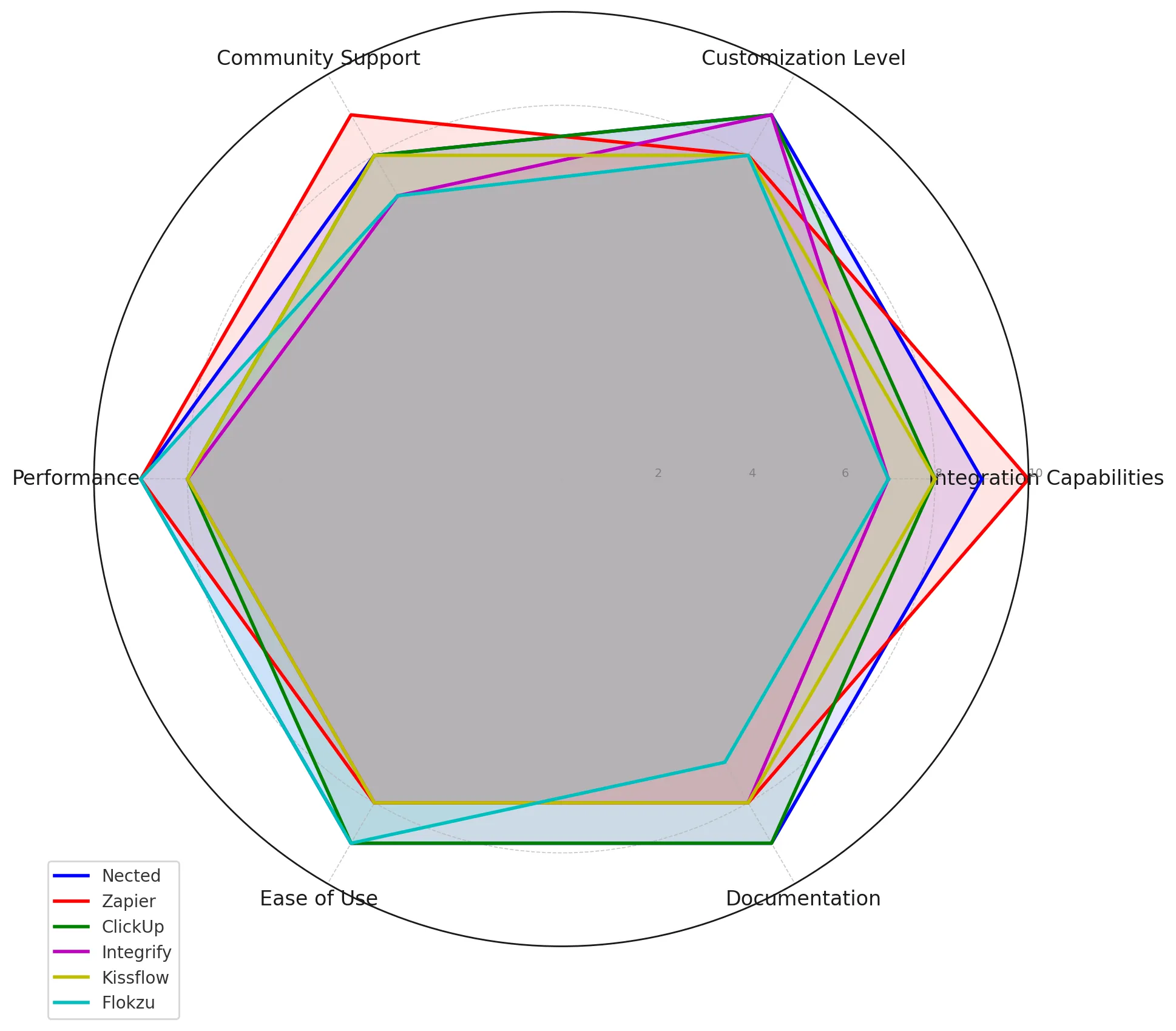
| Workflow Automation Platform | Integration Capabilities | Customization Level | Community Support | Performance | Ease of Use | Documentation | Overall Rating |
| Nected | 9 | 9 | 8 | 9 | 9 | 9 | 8.8 |
| Zapier | 10 | 8 | 9 | 9 | 8 | 8 | 8.7 |
| ClickUp | 8 | 9 | 8 | 8 | 9 | 9 | 8.5 |
| Integrify | 7 | 9 | 7 | 8 | 8 | 8 | 7.8 |
| Kissflow | 8 | 8 | 8 | 8 | 8 | 8 | 8.0 |
| Flokzu | 7 | 8 | 7 | 9 | 9 | 7 | 7.8 |
When selecting a workflow automation platform, aligning the platform’s strengths with your organization's specific needs is crucial. High customization and integration capabilities are key for complex workflows, making Nected and Zapier strong contenders. For those prioritizing ease of use and comprehensive support, ClickUp offers a compelling choice. The ultimate decision should consider your specific workflow requirements, the scale of automation needed, and the resources available for implementation and ongoing management.
Conclusion
In conclusion, navigating the landscape of business workflow automation software requires a thoughtful consideration of your business's unique needs and objectives. While this guide has highlighted the top 5 business workflow automation tools alongside Nected, showcasing each for its strengths and potential drawbacks, the decision ultimately hinges on matching the software's capabilities with your specific workflow requirements. Whether it's the extensive integrations of Zapier, the project management prowess of ClickUp, or the comprehensive workflow automation provided by Nected, the right choice is the one that aligns with your business strategy, enhances operational efficiency, and supports your team's productivity. Remember, the goal is not just to automate but to optimize your workflows for better business outcomes.
FAQs:
Q1. What is the difference between business process automation and workflow automation?
Business process automation focuses on automating entire processes, while workflow automation targets specific tasks within a process. Workflow automation is a subset of business process automation, honing in on streamlining individual tasks for efficiency.
Q2. How can workflow automation benefit small businesses?
Workflow automation can benefit small businesses by reducing manual errors, saving time, improving collaboration among team members, enhancing productivity, and enabling better resource allocation for growth.
Q3. What are some common examples of business workflow automation in action?
Examples include automated email marketing campaigns, invoice processing, employee onboarding workflows, customer support ticket routing, and inventory management systems that streamline order processing.
Q4. How do I ensure successful implementation of workflow automation software in my business?
Successful implementation involves thorough planning, clear communication with stakeholders, adequate training for users, regular monitoring and optimization of workflows, and aligning automation with business goals and processes.
Q5. Can workflow automation software be integrated with existing business applications?
Yes, many workflow automation software solutions offer integration capabilities with popular business applications such as CRM systems, project management tools, accounting software, and more. Integration ensures seamless data flow and enhances overall operational efficiency.



.svg)
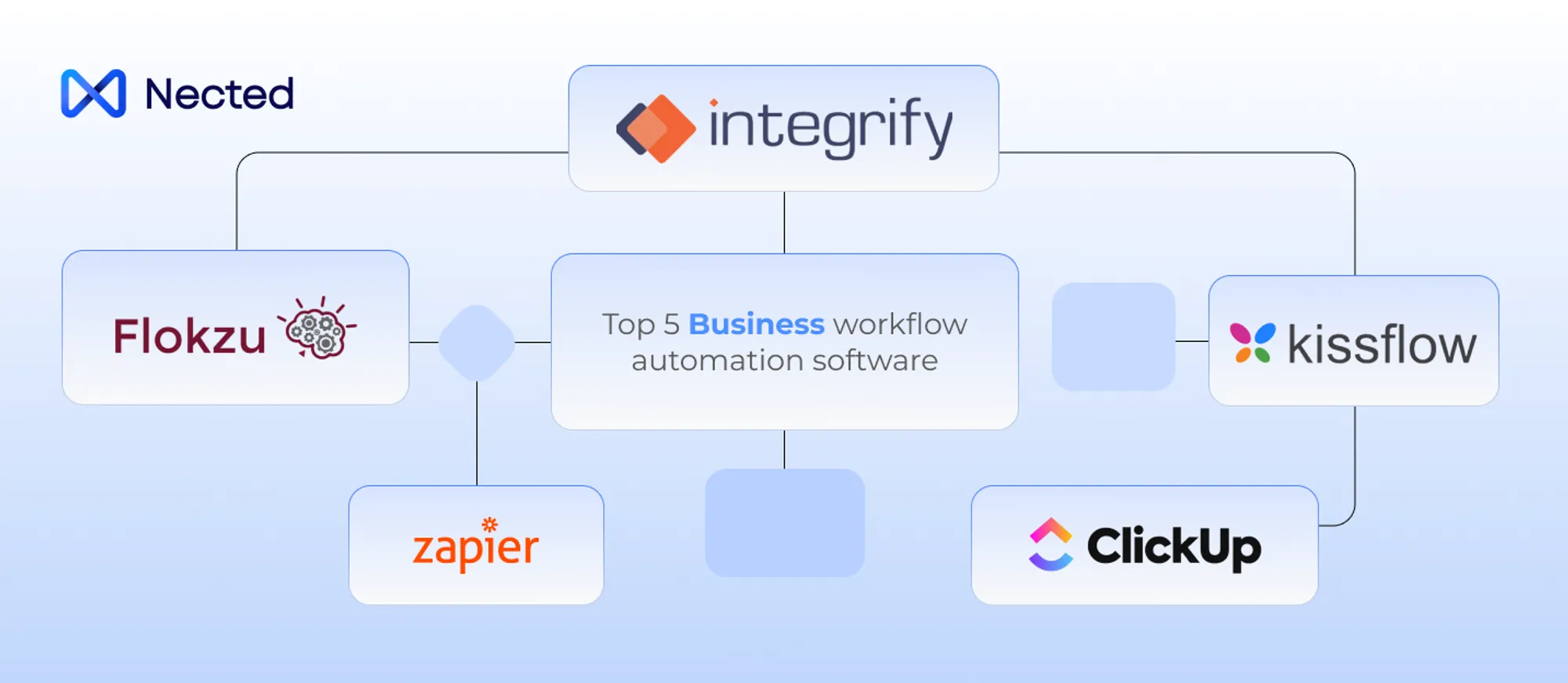



.png)





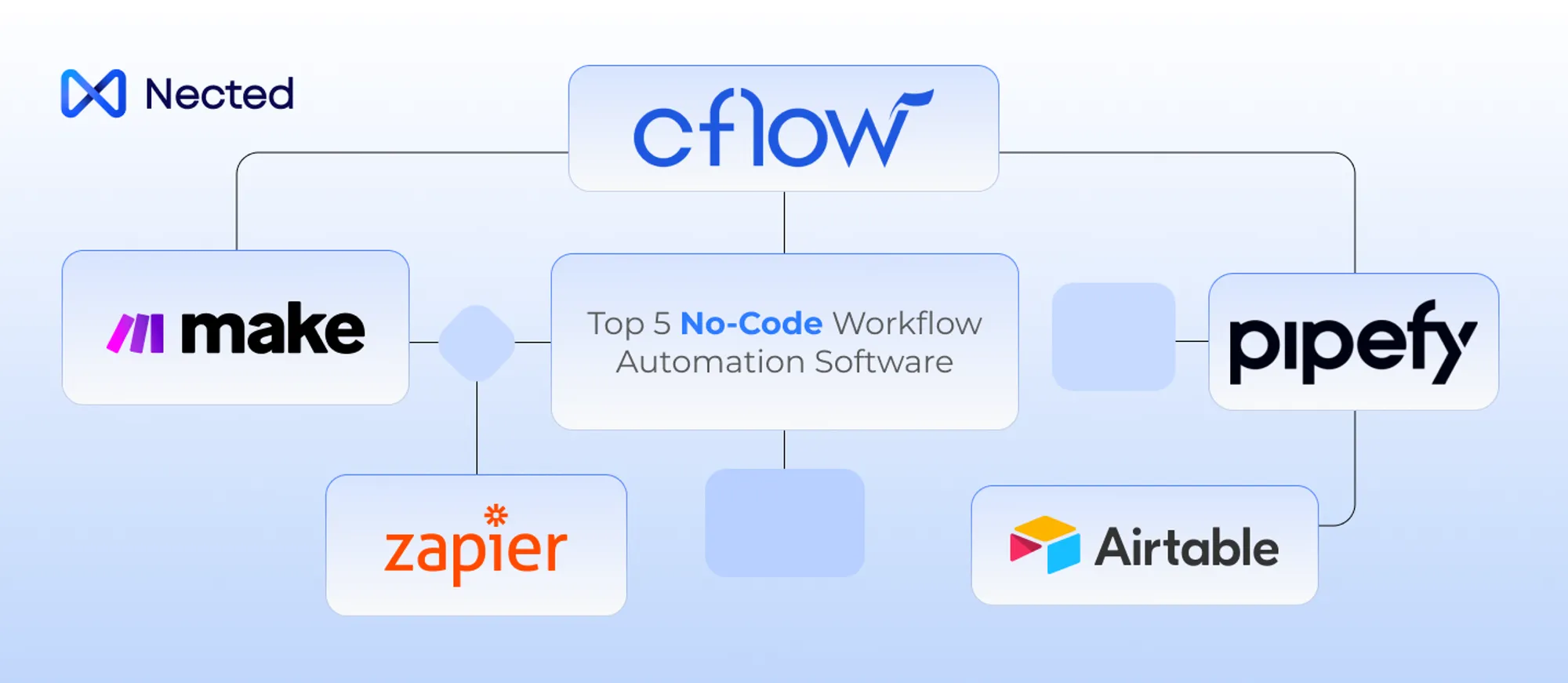
.svg.webp)


.png)

_result.webp)
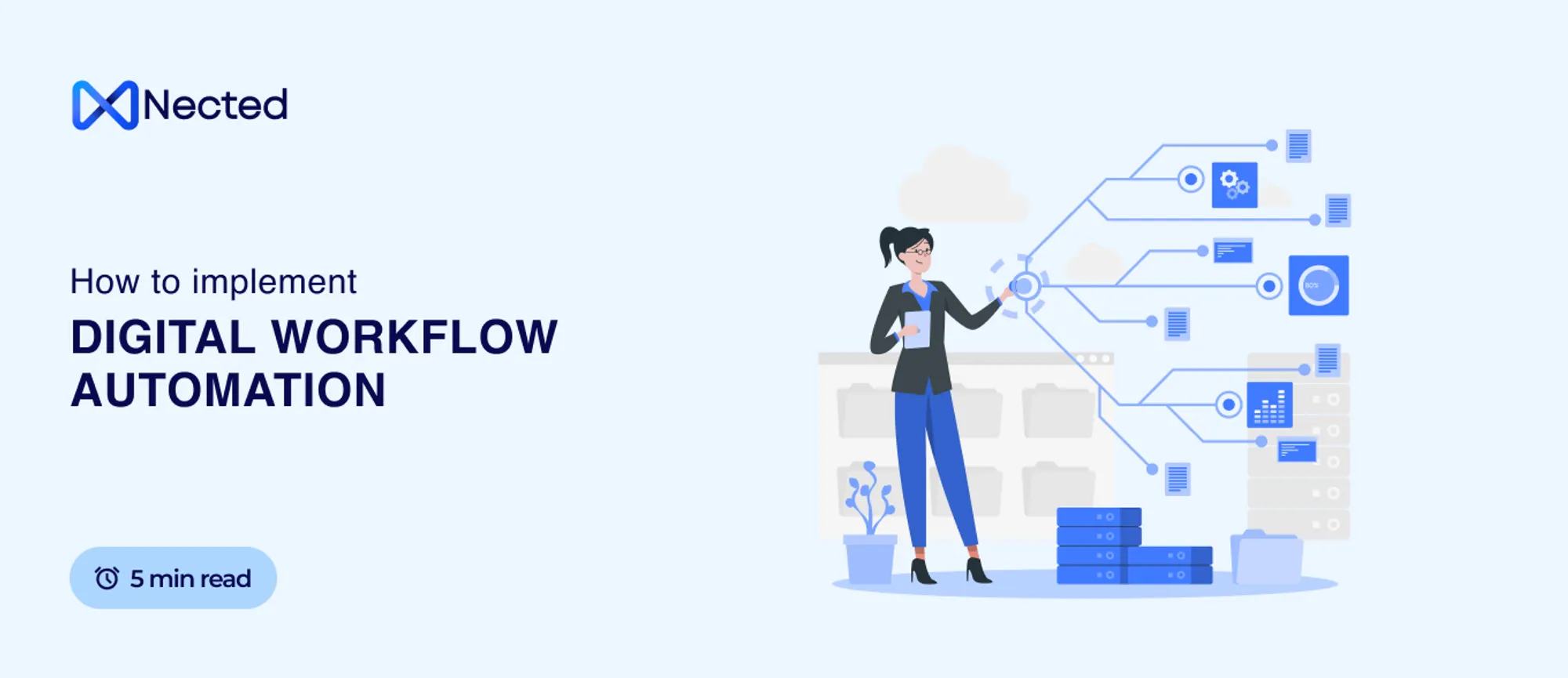
.webp)
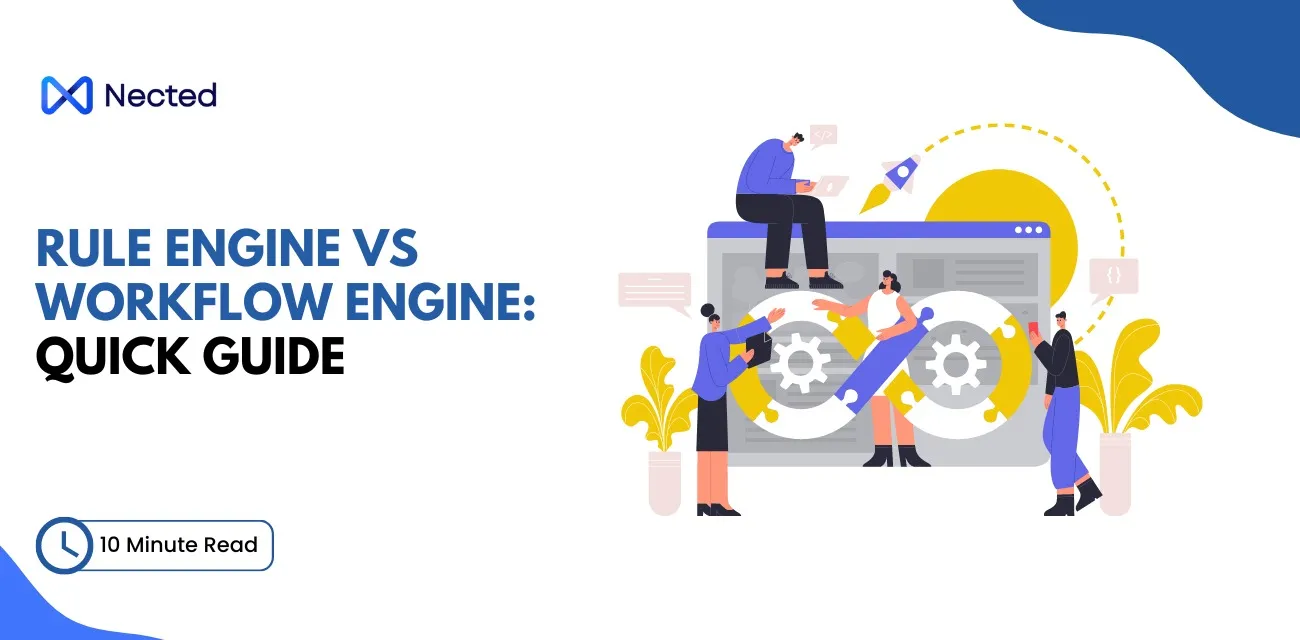
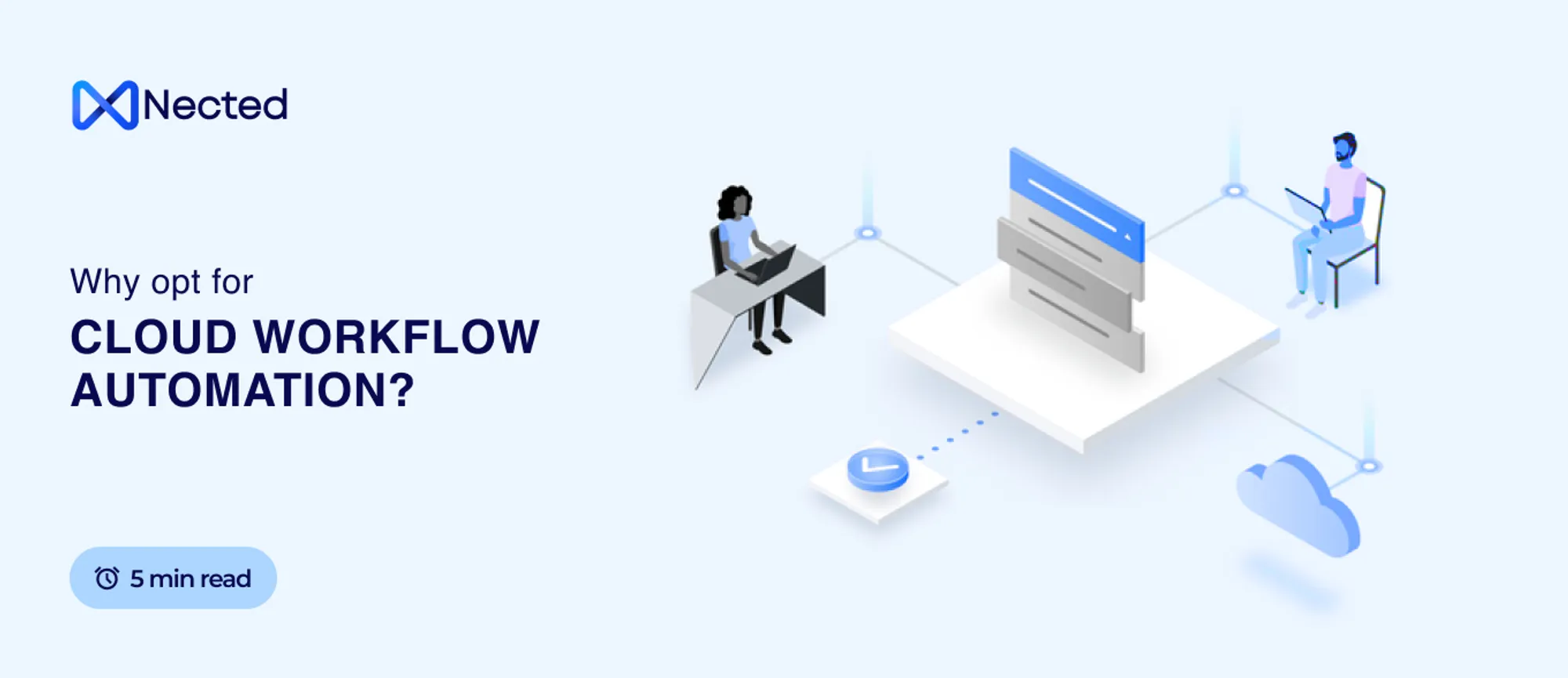
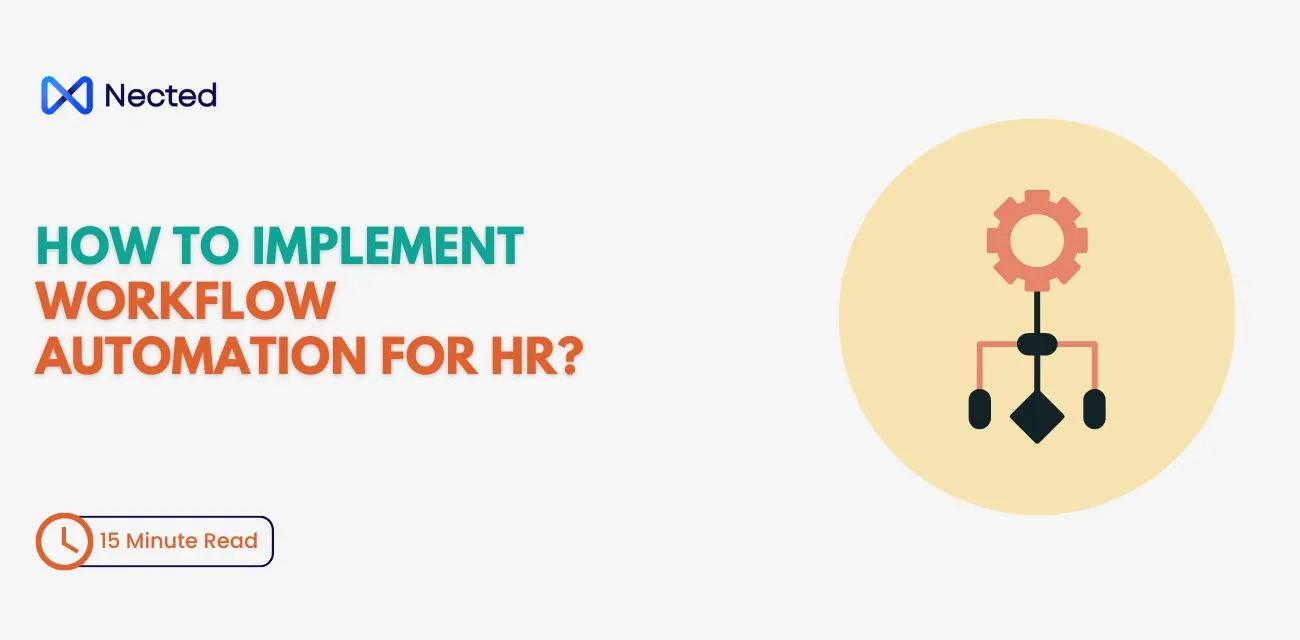
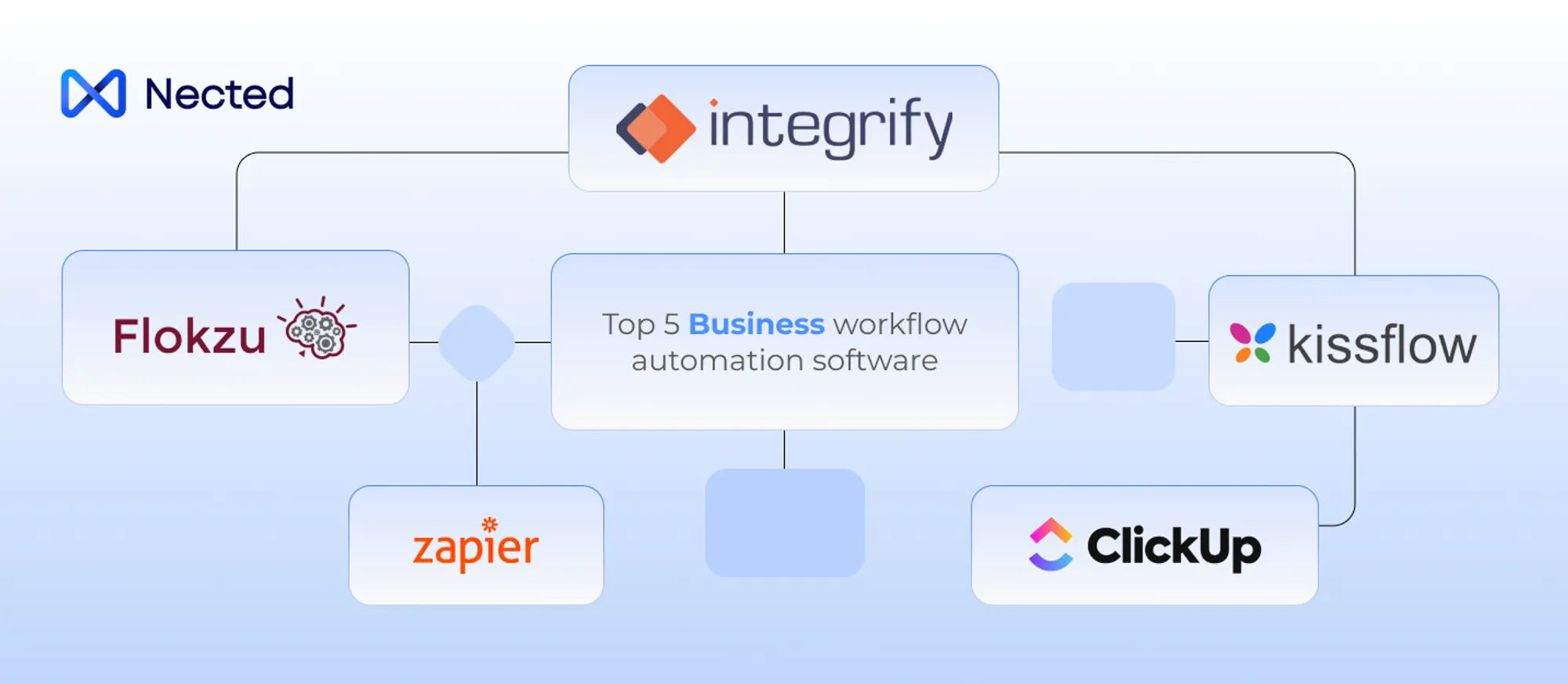
.webp)

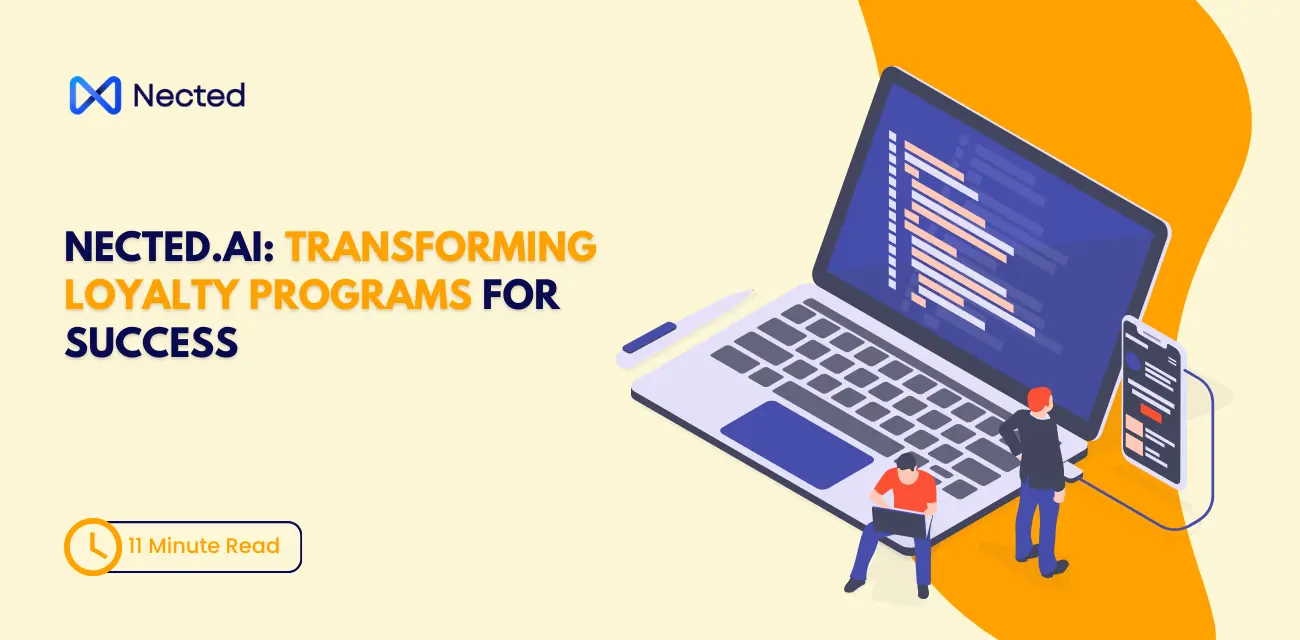
%20m.webp)
.webp)
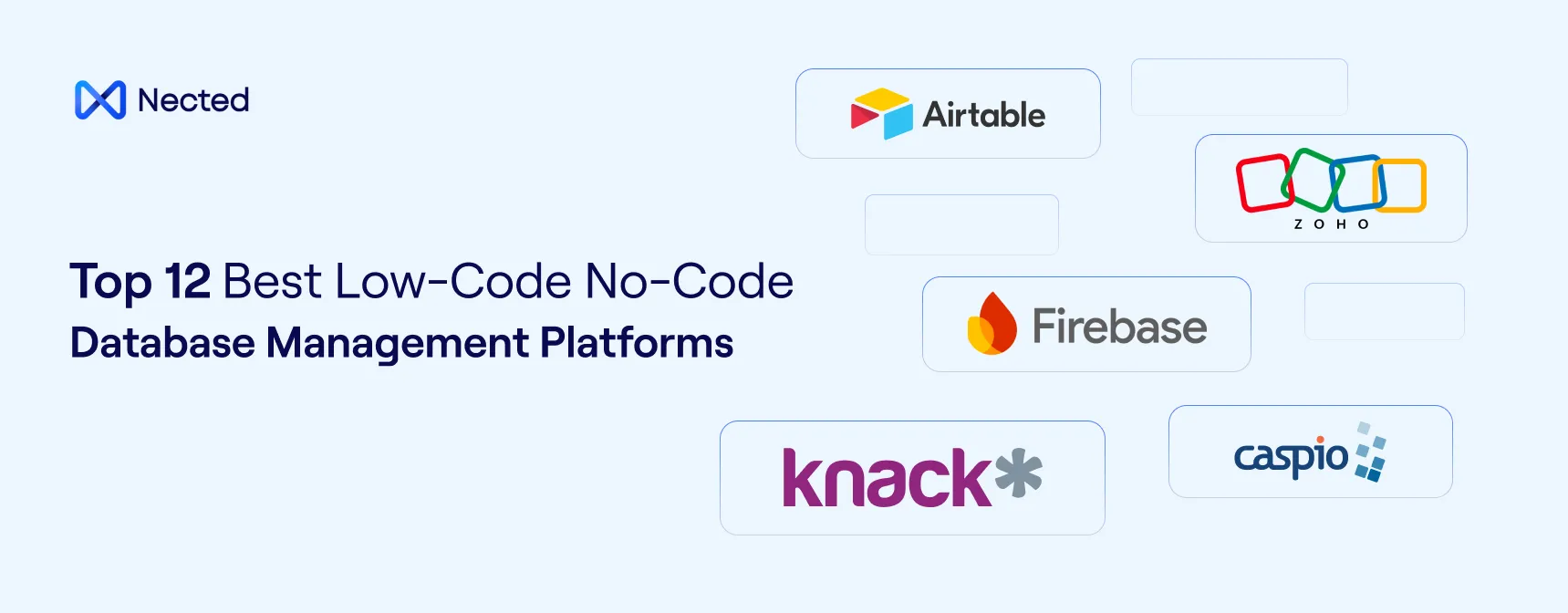

.webp)
.webp)






%20(1).webp)
